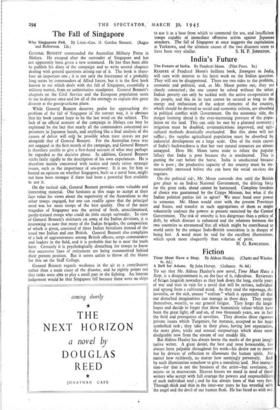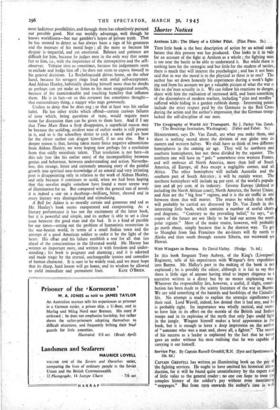Fiction
A Bell for Adano. By John Hersey. (Gollancz. 8s. 6d.) To say that Mr. Aldous Huxley's, new novel, Time Must Have a Stop, is a disappointment is, on the face of it, ridiculous. Reviewers of fiction languish nowadays as they look down .the long, sterile years of war and wait in vain for a novel that will be serious, individual and sprung from a cultivated mind. As they read the feportage, the juvenilia, or the sick, uneasy " realism " which is apparently all that our disturbed imaginatives can manage in these days. They resign themselves, wearily, to our general fatigue. They forgo the larger hopes and decide to forget that those humanistic values .which have been the great light, off and on, of two thousands years, are in fact the field and prerogative of novelists. They dismiss those rigorous private issues which Turgeniev, for instance accepted as his huge symbolical task ; they take in ;heir place, Waving lost expectation, the mere plots, tricks and sensual outpourings which alone seem dredgeable now from the stream of our muddy life.
But Aldous Huxley has always borne the marks of the great imagi- native writer. A great desire the best and most honourable, has always been palpable throughout his work—his desire not to invent but by devices of reflection to illuminate the human spirit. No matter how ruthlessly, no matter how seemingly perversely. And by such illumination somehow to give a moralistic lead. ,Not instruc- tion—for that is not the business of the artist--but revelation, in micro- or in macrocosm. Heaven knows we stand in need of those writers who accept with full courage the powers and responsibilities of each individual soul ; and .he has always been of that very few. Through thick and thin in the inter-war years he has wrestled with the angel and the devil of our human flesh. Helms faced us with our most ludicrous possibilities, and through them has relentlessly pursued our possible good. Not our worldly advantap, well though he knows worldliness—but our gambler's hopes of private truth. That he has seemed to detest us has always been a sign of his greatness and the measure of his moral hope ; all the more so because his despair is -impartial, and yet emotional. Balance and patience are difficult for him, because he judges men in the only way that seems fair to him, i.e., with the impatience of the introspective and the self- observer. Voltaire tires us sometimes, because his judgements seem to exclude and hedge him off ; he does not seem to expose himself to his general decisions. La Rochefoucauld drives home, on the other hand, because his savagery rings loud with awful self-acceptance. And Aldous Huxley, habitually shocking himself more than he shocks us perhaps can yet make us listen to his most exaggerated assaults, because of the unmistakeable and touching humility that inflames them. He is in fact—or so this reviewer has sometimes thought— that extraordinary thing, a nagger who nags generously.
Useless to deny that he does nag ; or that at least was his earlier habit. He has other tricks which offend—certain curious failures of taste which, being questions of taste, would require more room for discussion than can be given to them here. And if I say that Time Must Have a Stop disappoints, a superficial reason may be because the scolding, strident tone of earlier works is still present in it, and so is the schoolboy desire to cock a snook and see how far the clever author can disgust himself, if no one else. But a deeper reason is that, having taken many fierce negative admonitions from Aldous Huxley, we were hoping now perhaps for a resolution from that oddly moralistic talent. That resolution is not here—in this tale (too like his earlier ones) of the incompatibility between genius and behaviour, between understanding and action. Neverthe- less, this strange, bitter and extremely amusing story of the painful growth into spiritual near-knowledge of an amoral and very irritating poet is disappointing only in relation to the work of Aldous Huxley, and only because it continues to scold, when we had been hoping that this novelist might somehow have found a more serene way of illumination for us. But compared with the general run of novels it is indeed a star on a dustheap—brilliant, bitter, shrewd and in every literary way distinguished and stimulating.
A Bell for Adano is as morally certain and generous and sad as Mr. Huxley's book seems exasperated and exasperating. As a. literary performance it has not the excitement of the latter book, but it is powerful and simple, and its author is able to set a clear issue between the good man and the bad. It is a kind of parable for our times—setting out the problem of humanistic restoration in the war-beaten world, in terms of a small Italian town and the attempt of a good American soldier to order it by the light of the heart. His effort and his failure establish a text for all that lies ahead of the conscientious in the liberated world. Mr. Hersey has written an important story, and written it with freedom and under- standing ; his book is poignant and alarming ; and it is adorned and made tragic by the eternal, unchangeable ironies and comedies of human character. It is sure to be widely read, and we must hope that its sharp, hard lesson will go home, and its wisdom be allowed to yield immediate and permanent fruit. KATE O'BRIEN.























 Previous page
Previous page